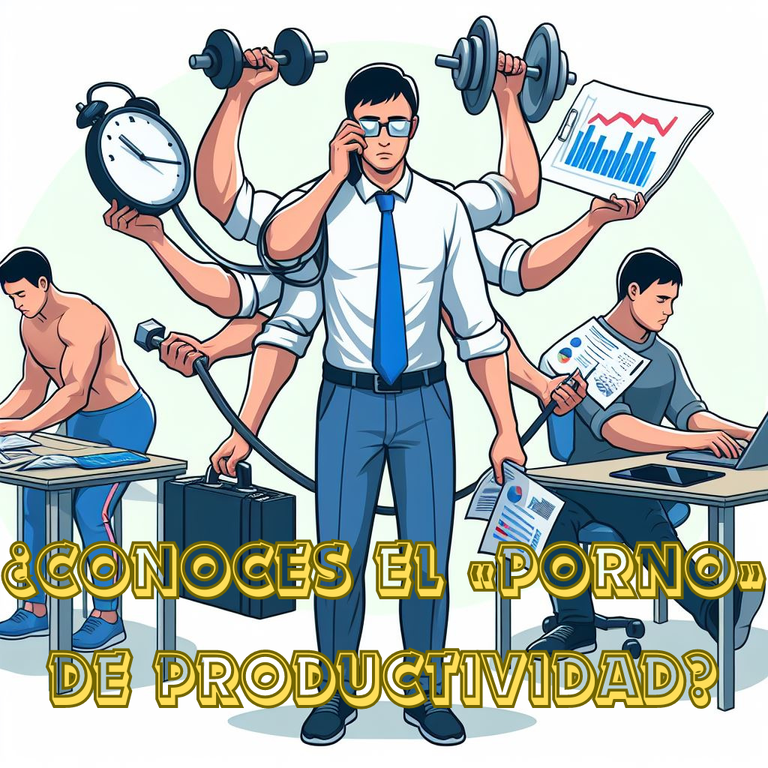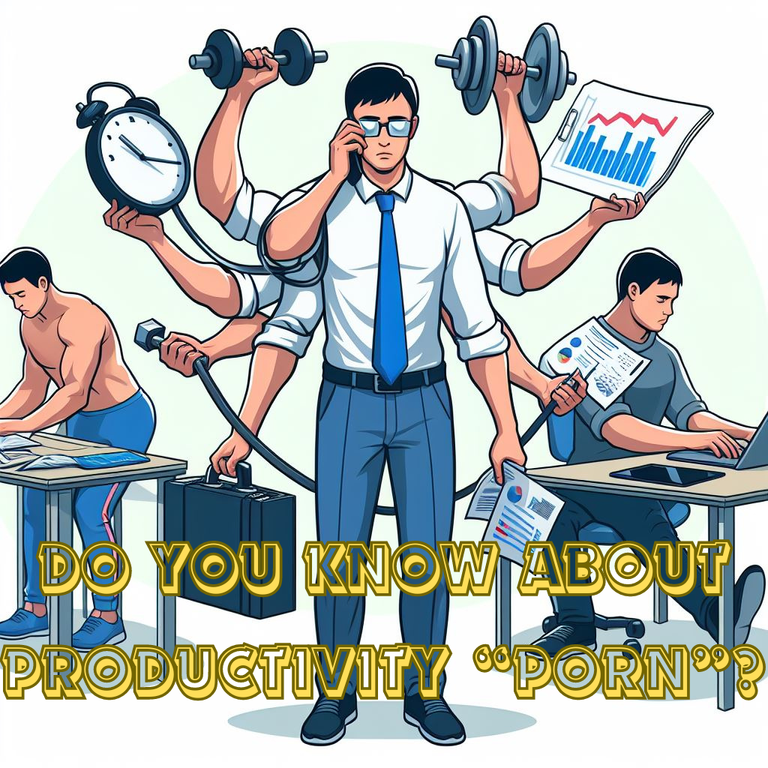¿Conoces el «porno» de productividad? | Do you know about productivity "porn"? [ES/EN]

Nos tocó vivir en una época con tiempos convulsos y agitados. Cada vez más se espera de nosotros mayor eficiencia y eso conlleva optimizar recursos tanto físicos como cognitivos. Sin embargo, existe un límite que marca hasta qué punto manifestamos una productividad funcional, o sea, esa que nos permite estar a la altura de las demandas de nuestro entorno, y cuándo nos hemos vuelto «adictos» a la «productividad».
Hoy por hoy la forma por excelencia de invisibilizar cualquier fenómeno es hiperbolizándolo y esto es, resaltarlo hasta sus últimas consecuencias. En esta llamada era digital donde los más jóvenes generalmente se han convertido en nativos digitales, en un contexto donde la información fluye a velocidades extraordinarias, la productividad se ha vuelto, digamos, una tendencia. Es así como podemos encontrarnos, sobre todo en redes sociales, con figuras que lucen estilos de vida «eficientes» y que comparten con sus seguidores las más óptimas rutinas para alcanzar el mayor rendimiento en el día; personas que mientras más hacen, más quieren hacer. Rendimiento que tiene que ver principalmente con cumplir con estándares socialmente aceptados de cómo ser una persona exitosa, o sea, que se da por sentado un único sentido de lo que es alcanzar el éxito.
Hasta aquí podemos decir que todo va bien, pero la cosa se complica cuando tenemos en cuenta que, en vez de la rutina servirnos para cumplir con nuestras metas diarias, nos convertimos nosotros en esclavos de esta, únicamente para dar una imagen, y tal vez, cumplir con lo esperado para un contexto específico. Son estas personas que pretenden llevar una vida fitness, healthy, estudiar varias cosas, llevar varios trabajos, etc., y todo esto en las 24 horas que tiene un día. estos sujetos son capaces de exigirse al límite y llevarse a puntos donde cabe preguntarse: ¿hasta qué punto es saludable fijarse tantos objetivos diarios?, ¿cuál es el verdadero objetivo de este estilo de vida?, ¿cuáles son las consecuencias y qué hay detrás de todo esto?
Si lo pensamos bien, en estas rutinas más allá de procurar apostar por el bienestar por la persona que la lleva a cabo, es todo lo contrario; nos estamos dejando fuera de la fórmula en donde lo que importa es solamente la imagen o la cercanía con el ideal de éxito. Si tenemos en cuenta que no existe «el éxito» per se, sino personas exitosas, podemos darnos cuenta de que es necesario pensarnos primero cuál es la definición de éxito para cada uno de nosotros y nosotras, y entonces, plantearnos metas y estrategias personalizadas. Una persona que solo se enfoca en cumplir con estándares socialmente impuestos y se olvida de sus propios tiempos, de sus propias necesidades, que no deja tiempo para el ocio tan necesario para nuestro bienestar, que no escucha a su cuerpo más allá de atiborrarlo con rutinas que lo que logran es omitirlo y por ende, dañarlo, no puede ser jamás una persona saludable, por el contrario, se ha convertido en un esclavo de la cultura de la productividad.

Es precisamente eso lo que la sociedad capitalista busca hoy en día; una fuerza de trabajo económicamente rentable y emocionalmente disponible, y por eso es que procurarse tiempos de ocio se ha vuelto subversivo, pues una persona que piensa en su bienestar ante todo es una persona difícil de controlar y persuadir. Y es que de eso va el autocuidado: de emitir comportamientos enfocados en el sí mismo y en el entorno, pero que terminen repercutiendo en el sí mismo, no en estándares comunes para las masas, porque es precisamente eso lo que quiere lograr.
Claro, reposar toda la responsabilidad en factores externos es hacer al ser humano un ser pasivo en cuanto a la toma de decisiones, y por ello es que es necesario hablar de que existen personas más propensas a llevar este estilo de vida que otras. Así, podemos hacer referencias a aquellas personas que se han socializado bajo estilos educativos, digamos, perfeccionistas, donde lo que se está criando es un niño o niña agenda. Se habla de aquellos infantes que tuvieron que aprender a lidiar con altos niveles de estrés y/o ansiedad a causa de rutinas impuestas por los padres y madres que consistían en muchas actividades educativas y que no dejaban tiempo para el propio infante, obviamente, dejando fuera el hecho de lo necesario del juego y el ocio en esas edades. Sin embargo, nadie queda exento de asumir y llevar a cabo estas rutinas a pesar de no haber sido criado de esta manera, puesto que, como decía antes, es una cuestión cultural.
A la larga, las consecuencias pueden ser nefastas porque puede llegar un punto en el que el cuerpo dice «hasta aquí» y colapsa. Y es por eso que vemos personas que se podría decir que padecen de cansancio crónico, personas que quieren hacer tanto, que al final no tienen tiempo para nada, personas que más que eficientes, son ineficientes. Es entendible y hasta cierto punto admirable, que tengamos la intención de hacer lo más que podamos, pero si tenemos en cuenta que no somos -aún- máquinas, veremos que mientras más tareas realizamos simultáneamente disminuirá nuestro rendimiento en cada una de ellas porque tendremos que dividir nuestros recursos físicos y cognitivos en varias partes. Además, ¿qué pasa cuando aceleras demasiado y sostenidamente a un motor?, pues se sobrecalienta y se funde. Lo mismo pasa con las personas, y por eso existe la dañina sobremotivación.
Mi llamado es que seamos eficientes, no esclavos. Efectivamente, existen rutinas muy útiles y necesarias, siempre y cuando pongan el foco en la propia persona y no en este sistema desgarrador y desgastante. Es triste ver cómo a pesar de adoptar estos estilos de vida nocivos, existe siempre quien se aprovecha para vender y ganar a costa de un nuevo libro best seller que promete el éxito si adoptas una nueva mentalidad y seguir esparciendo el virus de la ignorancia; la ignorancia del sí mismo.
English version

We live in an era of turbulent and hectic times. Increasingly, greater efficiency is expected of us, and this entails optimising both physical and cognitive resources. However, there is a limit to the extent to which we manifest a functional productivity, that is, one that allows us to keep up with the demands of our environment, and when we have become "addicted" to "productivity".
Nowadays, the way par excellence to make any phenomenon invisible is to hyperbolise it, that is, to highlight it to its ultimate consequences. In this so-called digital era where the youngest have generally become digital natives, in a context where information flows at extraordinary speeds, productivity has become, shall we say, a trend. This is how we can find, especially on social networks, figures who show off "efficient" lifestyles and who share with their followers the best routines to achieve the best performance in the day; people who, the more they do, the more they want to do. Performance that has to do mainly with meeting socially accepted standards of how to be a successful person, i.e. a single sense of what success looks like is taken for granted.
So far we can say that everything is fine, but things get complicated when we take into account that, instead of the routine serving us to fulfil our daily goals, we become slaves to it, only to give an image, and perhaps, to fulfil what is expected for a specific context. These are the people who try to lead a fitness, healthy life, study various things, do various jobs, etc., and all this in the 24 hours of a day. These people are capable of pushing themselves to the limit and take themselves to points where it is worth asking: to what extent is it healthy to set so many daily goals, what is the real objective of this lifestyle, what are the consequences and what is behind all this?
If we think about it, in these routines we are not only trying to achieve wellbeing for the person who carries them out, but quite the opposite; we are leaving ourselves out of the formula where what matters is only the image or the closeness to the ideal of success. If we take into account that there is no such thing as "success" per se, but rather successful people, we can realise that it is necessary to first think about what the definition of success is for each of us, and then to set personalised goals and strategies. A person who only focuses on complying with socially imposed standards and forgets his or her own time, his or her own needs, who does not leave time for the leisure time so necessary for our well-being, who does not listen to his or her body beyond stuffing it with routines that only manage to omit it and therefore damage it, can never be a healthy person; on the contrary, he or she has become a slave to the culture of productivity.

That is precisely what capitalist society is looking for nowadays; an economically profitable and emotionally available workforce, and that is why procuring leisure time has become subversive, because a person who thinks about his or her well-being first and foremost is a person who is difficult to control and persuade. And that is what self-care is all about: emitting behaviours that focus on the self and the environment, but that end up having an impact on the self, not on common standards for the masses, because that is precisely what it wants to achieve.
Of course, to place all responsibility on external factors is to make the human being a passive decision-maker, and that is why it is necessary to talk about the fact that there are people who are more prone to this lifestyle than others. Thus, we can make reference to those people who have been socialised under educational styles, let's say, perfectionist, where what is being raised is a child's agenda. We speak of those infants who had to learn to cope with high levels of stress and/or anxiety because of routines imposed by parents consisting of many educational activities that left no time for the infant itself, obviously leaving out the fact that play and leisure are necessary at that age. However, no one is exempt from assuming and carrying out these routines despite not having been brought up in this way, since, as I said before, it is a cultural issue.
In the long run, the consequences can be dire because there can come a point where the body says "enough is enough" and collapses. And that is why we see people who could be said to suffer from chronic fatigue, people who want to do so much that in the end they have no time for anything, people who are inefficient rather than efficient. It is understandable, and to some extent admirable, that we intend to do as much as we can, but if we take into account that we are not -yet- machines, we will see that the more tasks we perform simultaneously, the more our performance in each of them will decrease because we will have to divide our physical and cognitive resources into several parts. Besides, what happens when you accelerate an engine too much and too steadily, it overheats and melts down. The same thing happens to people, and that is why there is such a thing as harmful overmotivation.
My call is to be efficient, not slaves. Indeed, there are very useful and necessary routines, as long as they put the focus on the person and not on this heartbreaking and exhausting system. It is sad to see how despite adopting these harmful lifestyles, there are always those who take advantage to sell and gain at the expense of a new best seller book that promises success if you adopt a new mentality and continue to spread the virus of ignorance; the ignorance of the self.

Créditos | Credits
Imágenes utilizadas | Images used
Todas las imágenes utilizadas son de mi propiedad y fueron generadas utilizando la IA de Bing Image Creator y editadas en Canva | All images used are my own property and were generated using Bing Image Creator AI and were edited using Canva.
Traducción | Translation
Te puede interesar | You may be interested in
Juventud conectada: forjando identidades | Connected youth: forging identities [ES/EN]
Año nuevo, mismas frustraciones | New year, same frustrations. [ES/EN]
¿Feliz navidad o feliz Saturnalia? | Merry Christmas or Happy Saturnalia? [ES/EN]
Quererse a uno mismo, pero a qué precio | Loving yourself, but at what price [ES/EN]
Sígueme en mis redes sociales | Follow me on my social media platforms
|X|
|LinkedIn|
Congratulations @genrigp! You have completed the following achievement on the Hive blockchain And have been rewarded with New badge(s)
Your next target is to reach 1750 upvotes.
You can view your badges on your board and compare yourself to others in the Ranking
If you no longer want to receive notifications, reply to this comment with the word
STOPTo support your work, I also upvoted your post!
Check out our last posts:
Excelente artículo. Reconozco que he sufrido a veces de esto.
Gracias Diane. En alguna medida creo que todos hemos pasado por esto. Lo importante es concientizarlo y no dejar que nos consuma.
Así es 😊
Totalmente de acuerdo, siempre he dicho que eso de ser multitask nunca termina en nada bueno. Demasiada información para el cerebro, demasiado cansancio neuronal, y estrés que a la larga solo nos traen problemas.
Por experiencia hablo de esto. Necesité un descanso largo en mi vida profesional luego de unos dos años siendo multitask y llevando 4 trabajos al mismo tiempo. De ahí, que me dedique a explorar las técnicas de optimización y gestión del tiempo. No solo profesional sino en mi vida personal. Y lejos de leerme a los "gurús" del mercado, he buscado ejemplos que han triunfado, no para imitarlos, sino para analizar, y adaptar esas estrategias en mi vida.
Baff, pues me alegro de leer eso, de verdad. Gracias por llegarte a leer. ☺️